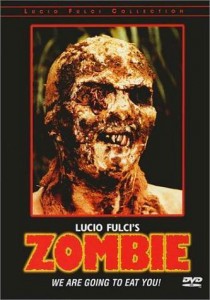 I recently became aware of a post that my fellow LOTTD member, B-Sol of The Vault of Horror did last month. It is titled “‘Take This, All of You, and Eat It’: The Subversion of Catholicism in Italian Zombie Cinema.” As the title indicates, this post suggests that in Italy, one of the most Roman Catholic nations of the world, a series of zombie films have been made that set out to specifically subvert aspects of Catholic Christianity. This includes the Resurrection of Christ, the resurrection of the body, the soul and the afterlife, the Day of Judgment, and Transubstantiation in Catholic communion.
I recently became aware of a post that my fellow LOTTD member, B-Sol of The Vault of Horror did last month. It is titled “‘Take This, All of You, and Eat It’: The Subversion of Catholicism in Italian Zombie Cinema.” As the title indicates, this post suggests that in Italy, one of the most Roman Catholic nations of the world, a series of zombie films have been made that set out to specifically subvert aspects of Catholic Christianity. This includes the Resurrection of Christ, the resurrection of the body, the soul and the afterlife, the Day of Judgment, and Transubstantiation in Catholic communion.
I believe this post shows great merit for further reflection for religious studies and popular culture studies scholars, but I would add my disagreement with statements from two quotations in this piece. When discussing the ideas of Christianity related to the body and resurrection, we find the following:
As Stephen Thrower writes in Beyond Terror: The Films of Lucio Fulci, “for Christians, the body is a mere waste product, excreted by the passage of the soul into heaven.”
I would agree that on a popular level in Western Christianity the body is de-emphasized in favor of an emphasis on the soul’s escape at death into a heavenly afterlife. This view unfortunately leads to a lack of appreciation for the value of the body both in this life and the next, as well as a denigration of the value of material creation in general. In this way popular Western Christianity seems to represent a pseudo-Gnosticism. But the Christian tradition in general has always valued the body, both in its mortal expression, as well as in its anticipated resurrected and immortal state. With this thought in mind perhaps Fulci’s zombie films subvert Christian misunderstandings and practice of their own tradition rather than the essence of the tradition itself.
A little later in this piece in a discussion of death and the afterlife we read;
“These films,” writes Jamie Russell in Book of the Dead, “ask us to confront the unspoken truth of our existence: that we are, in material terms, nothing more than a collection of organs, blood and messy slop.”
I find it interesting that in light of developments in the neurosciences, some Christians are beginning to rethink the traditional concept of human nature as a duality of body and immaterial spirit or soul. In works like Whatever Happened to the Soul?: Scientific and Theological Portraits of Human Nature, edited by Warren S. Brown, Nancey Murphy, and H. Newton Maloney (Augsburg Fortress Publishers, 1998), a group of scholars from various disciplines argue scientifically as well as theologically for an emphasis on a holistic understanding of human nature that they call “non-reductive physicalism.” In this view the properties once attributed to the soul or spirit are recognized as taking place in the brain and human consciousness without the need to posit an immaterial property or substance, but even so, this need not mean that human beings are “nothing but” organic material with no transcendent significance. So while Italian zombie films do indeed serve as a grim reminder of our physicality and mortality as they are envisioned in a nihilistic universe, it is possible to value our fallible flesh with some hope of possible transcendence.
The Vault of Horror is to be commended for helping horror fans probe Italian zombie films in more depth. This is an example of the best kind of cultural, religious, and cinematic analysis that the horror subculture needs more of.





John, I thank you for taking such an interest in my post–as i stated before, I consider you something of an authority on the interrelation of horror and religion, and your input is very valuable to me.
There can be no question that Thrower (and to a lesser extent, Russell) take a somewhat sensationalized stance, which does not seem to hold Catholicism in very high regard to begin with. That much is clear. In my own analysis, I tried to approach the subject matter in such as to not alienate those who are believers.
I think, as you’ve indicated, that the response of Italian horror film makers toward Catholicism when making these zombie films is not necessarily a response to the historical institution of the Church itself, but rather the bastardized modern form it has taken in Italian popular culture (as well as elsewhere.)
I appreciate your clarifications. I think you did a good job of noting the subversion of Catholicism in these films without stating whether you thought such subversion was warranted. I appreciate your insights and the way you handled these films.